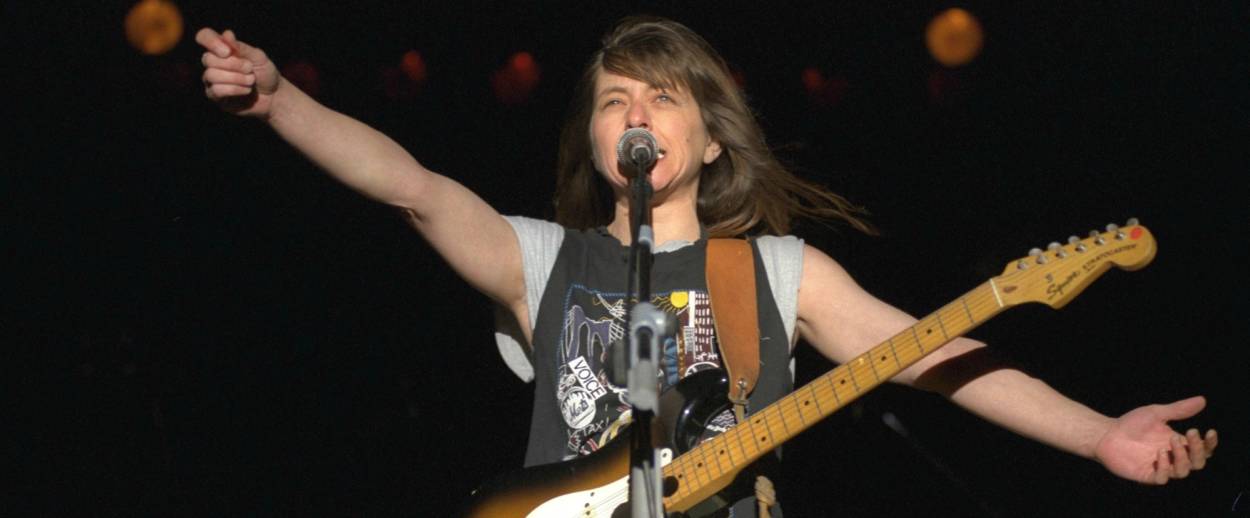Chag Valentine Sameach! Here Are the Seven Most Gorgeous Hebrew Love Songs of All Time
Love of men, love of women, love of God, love of sex: It all sounds better in Lashon HaKodesh




And so, it’s Valentine’s Day. Feh. Named for a saint and championed by the crassest crusaders of commerce, today isn’t much of a simcha for Jews. For that, we have Tu B’Av, which has a much better origin story and is celebrated in the summer, which is when sensuous festivals ought to be celebrated. But if you’re in the mood for love despite the sub-arctic temperature outside, you should at least consider commemorating the holiday in the most romantic language ever created: Hebrew.
Fine, so all these khh sounds may be a bit off-putting. But take it from the angels: “I love you” never sounds as meaningful as it does when spoken in Lashon Ha’Kodesh, the holiest of languages. So let’s get amorous with a little playlist to kick off the day of some of the greatest Hebrew love songs ever recorded:
Meir Ariel: Lo Yakhol Lehorid Mimekh Et Ha’Einayim (Can’t Take My Eyes Off of You)
Calling the late Ariel Israel’s Bob Dylan would be paying the Nobel laureate an undue compliment. As sweet as he is piercing, Ariel is the kind of singer who can be playful one moment and then turn around and break your heart, leaving you trembling with too much insight to take. And when he writes a love song, confessing his imperfections and declaring his devotion to his wife of so many years, you realize that this is just what you want: Not the plastic and elastic love of the young and the restless but the settled, wounded, and endlessly deep love of the mature, the wise, and the open-hearted:
Corinne Allal: Zot Lo Khochma Lomar Je T’aime (There’s No Use Saying Je T’aime)
OK, so this is not exactly a love song. But when it comes to the purity and the power of Hebrew expressions of love, Allal gets it: Born in Tunisia, she made aliya with her family as a child, but her music remained steeped in the Francophone culture of her youth. Which only taught her how easy it is to say je t’aime, and how difficult to open up with an ani ohev or ohevet. So she wrote this fun but profound song to warn young lovers from Eilat to Metula to speak their mind in their mother tongue: “In Hebrew,” she croons, “it all sounds just a little bit more committed”:
Idan Raichel: MiMaamakim (From the Depths)
Unlike the speaker in that famous psalm, Raichel’s call from the depths isn’t directed at God, but at a loved one. Still, the longing and beauty he evokes feel every bit as mystical:
Etti Ankri: Bechol Libi (With All My Heart)
Usually, when a popular Israeli entertainer grows religious, he or she disappears into a life of quiet contemplation and Torah study. Ankri, one of the most prominent singers of the 1990s, traveled in the opposite direction, recording a string of albums that capture her passion and her faith. The latest one features Ankri’s musical adaptation of Rabbi Yehuda Halevi’s poetry. The yearning Halevi so gorgeously captures is for God, but its grace reverberates here on earth, too, even hundreds of years after the poem was written, and delivered by Ankri’s angelic voice is profoundly moving:
Shalom Hanoch: Lo Yodeh Eich Lomar Lach (Don’t Know How to Tell You)
Israeli men aren’t known for their capacity for words, particularly ones that are tender and heartfelt. So Hanoch, the Founding Father of Israeli rock, wrote this gem about not knowing how to tell his sweetheart how much he cares. Generations of gruff guys, playing this for their girlfriends, were eternally grateful:
HaMakhsefot: Ad HaOneg Haba (Until the Next Pleasure Comes)
It’s a V-Day-themed list, and so one song at least ought to be dedicated to, you know, pleasure. The band, Hebrew for “The Witches,” rocked Israel from their first album, in 1994: In a musical landscape dominated mostly by male crooners singing soulful, sad songs, three young women with guitars and attitudes singing about sex and their desires were a sensation. This is the band’s first single, and a sad reminder that its composer and singer, bandleader Inbal Perlmuter, was killed in a car crash in 1997, a 26-year-old artist in her prime. But what a legacy she leaves behind to inspire the next generations of uncompromising lovers:
Arik Einstein: Atur Mitzchech Zahav Shachor (Your Forehead is Laced with Black Gold)
This is probably not only the greatest love song ever written in Hebrew, but also the greatest Hebrew song ever recorded, period. You hardly need to speak the language to understand what this marvel is about: Painful, unrequited love. “Whoever shall have you,” wrote the song’s lyricist, the poet Avraham Halfi, “his life will be full of song.” Amen to that, brother:
Liel Leibovitz is editor-at-large for Tablet Magazine and a host of its weekly culture podcast Unorthodox and daily Talmud podcast Take One. He is the editor of Zionism: The Tablet Guide.